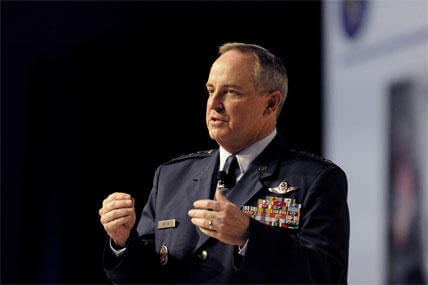WASHINGTON -- The Air Force chief of staff spoke about the current state of the service during the Air Force Association's Air and Space Conference and Technology Exposition Sept. 18.
Gen. Mark A. Welsh III recognized the Air Force's birthday, giving tribute to airpower icons and sharing the stories of present-day Airmen against the backdrop of an ever-changing force.
Developing, evolving and advancing, the general explained, are where the Air Force excels.
"Innovation is what we're all about -- we always have been," Welsh said, adding that the service offers the technology, great people, an important mission and a focus that nobody else brings.
"Innovation -- it's everywhere in our Air Force," he said. "The F-22 (Raptor) is an entire farm of innovation. It does things no airplane can do and no airplane will be able to do for a while."
Since its inception 65 years ago, the force has seen its share of changes, and more lie ahead, Welsh said, noting how budgetary pressures, particularly the possibility of sequestration, have spurred reassessment of programs across the Defense Department.
"It's time for an honest look in the mirror," Welsh said. "Who are we going to be when we grow up? It's time to think seriously about that."
The general spoke candidly about the complexities of evolving philosophies and programs.
"Our doctrinal terms are changing; what we're calling missions is changing," Welsh said, advocating a back-to-basics approach to keep the Air Force on the right path.
In 1947, the Air Force became a separate service and the executive order enacting this listed the force's primary missions, Welsh explained.
Among the service's listed missions were air superiority, strategic air forces, air reconnaissance, airlift, air support for ground forces and coordination of air defense.
"Sound familiar?" Welsh asked. "(The missions) haven't changed -- these are still the things that our combatant commanders expect us to deliver."
The Air Force's loss of air superiority would change the Army's and the Marine Corps' ground tactics, Welsh said.
"This is a foundational element of the use of airpower in joint warfighting," he added.
The general reinforced his point with the story of an Army colleague. His friend shared that he'd been deployed several times, and frequently worried about supply routes, perimeter defense, and enemy attacks.
But pointing skyward Welsh's friend spoke frankly, "Not once in my career have I ever worried about anything up there."
Such instances, the general said, are a testimony to the contributions of airpower to the fight.
"Since Curtis LeMay, we have been the best in the world and we will remain that way," Welsh said.





























